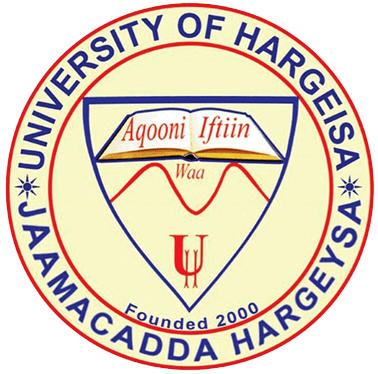|
POSITION DESCRIPTION |
|
| Position title | Call for PhD Fellowship in Molecular Biology(1 Position) |
| Open | Internal and External Candidates |
| Division | Directorate for Research and Community Service |
| Deadline for Application | 27 March 2024 |
Background
The University of Hargeisa started operation in the year 2000, It is the largest and leading chartered public university in the Republic of Somaliland. It is the leading higher education institution in the country and it is committed to providing a wide range of undergraduate and postgraduate degree programs. The goal of the university is to equip all graduates the skills needed for success in their future careers and to contribute to wider processes of educational and professional development in Somaliland. “TOWARDS A BETTER FUTURE” Is our motto and we take pride in living it every day.
Project Outline:
The Danish Ministry of Foreign Affairs, through the Consultative Research Committee for Development Research (FFU), has recently granted full support to the research project: “Mitigating emerging climate-sensitive disease vectors amongst internally displaced communities in Somaliland (DVSOMA).” This support includes funding for a PhD fellowship focusing on entomology, epidemiology, and molecular biology.
Objective:
The overall objective is to promote resilience to climate-driven vector-borne diseases (VBD) within Internally Displaced People (IDP) camps and their surrounding communities in Somaliland by strengthening of the local capacity to adapt integrated vector control and surveillance approaches.
The objective of the PhD study is to determine spatiotemporal distribution and abundance of Anopheles and Aedes vectors as well as determine the burden of malaria and dengue and the risk predictors of VBDs in selected IDP camps and surrounding communities in Somaliland.
The PhD fellow’s study will utilize molecular methodologies (e.g., PCR, qRT-PCR) to determine vector speciation and pathogen infection based on two years of monthly sampling of mosquito vectors of malaria (Anopheles) and arbovirus (Aedes). Additionally, the study will involve determining vector-bite exposure (IgG to mosquito salivary gland proteins) and pathogen infection/exposure (IgG to malaria and arbovirus antigens) of individuals through cross-sectional surveys in IDP camps (using ELISA). While fieldwork activities are involved, most of the work will be laboratory-based, conducted in close collaboration with a larger team of local and international researchers working on the project. The obtained results, including baseline demographics, will be correlated to climate and ecology over the sampling period to predict vector distribution, abundance, and the risk of vector-borne disease infection.
Qualifications:
– Valid membership of the academic staff of the University of Hargeisa.
– Candidates must hold a relevant Master of Science degree within the field of natural sciences from a recognized institution.
– Experience with molecular techniques is essential, and prior training/experience with serologicaltechniqueswill be advantageous.
– Strong communication skills in English, both oral and written, are required.
– Previous publications/work related to the research theme are considered an asset.
– Willingness to commit full-time effort to the PhD training programme.
– Willingness to serve as permanent teaching staff at UoH, conduct extensive field research in Somaliland and spend time abroad.
– Candidates must be less than 40 years old to be eligible for consideration.
– Internal Candidates and Female candidates are strongly encouraged to apply.
Application:
Applications must include the following documents:
– Cover letter (max. 1 page)
– Short concept note focusing on the subject of the PhD call, particularly on climate changes and the risk of vector-borne diseases in Somaliland (max. 2 pages, excluding references)
– Recent CV in Europass format (max. 2 pages), indicating previous and/or current employers and positions held, as well as a list of peer-reviewed publications (if any).
– Certified copies of academic transcripts and relevant certificates.
– Letters of recommendation from two referees, including phone numbers and email addresses.
Application Deadline:
Applications must be submitted to the Director, Human Resource Management, University of Hargeisa through e-mail: director.hr@uoh.edu.so, and copied to Principal Investigator Christian Wang, through cwang@sund.ku.dk, before 27.03.2024. Applications received later than this date will not be considered.
Please, note that only short-listed candidates will be contacted for a selection interview. The interview will take place on the 23rd of April 2024.
PhD Enrollment and Evaluation:
The successful candidate will be enrolled at auniversity in Tanzania and offered a 4-year PhD scholarship covering university fees, research costs, and a student stipend in accordance with institutional regulations of the University of Hargeisa. The PhD supervision will be a joint effort betweenthree universities from Somaliland,Denmark, and Tanzania. The PhD fellow will have the opportunity to take advanced courses in Tanzania and Denmark. Evaluation of the progress of the PhD activities will be done according to current regulations at the three universitiesinvolved and Somaliland’sMinistry of Health and Development.
Commencement:
The program is scheduled to commence during the academic year of 2024.

_________________________________________________________________________________
The DVSOMA project is funded by the Danish Ministry of Foreign Affairs Center (DFC) and is headed by the University of Copenhagen in collaboration with University of Hargeisa, Social Research and Development Institute, and Roskilde University.
